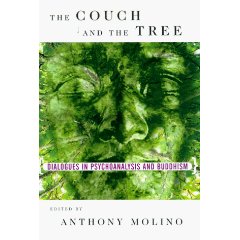I started reading this book, The Couch and the Tree: Dialogues in Psychoanalysis and Buddhism, edited by Anthony Molino. It is a compilation of essays, the first of which is titled “Psychology in Primitive Buddhism,” by Joe Tom Sun, published in 1924. The essay is a paragraph by paragraph comparison of basic Buddhist concepts with basic Freudian thinking.

This paragraph was particularly interesting to me:
“Profound insight into the psychology of the conscious mind was attained and later expounded in their [Buddhist] philosophy. Emotion, for example, was frankly stated to be due to ignorance. A casual glance at the underlying motive for the majority of emotional outbreaks will make it clear that these are due to the mechanism of displacement, a by-product of ignorance, lack of psychic insight. Furthermore, a morbid emotion is not cured by merely teaching a patient its etiology. Its cure is, however, brought about by analysis (vijja, wisdom) which is characterized by instruction and the deepest of meditation – that is, free association and being led gently backwards from the present effect to the past cause” (7).
What do you guys think?
